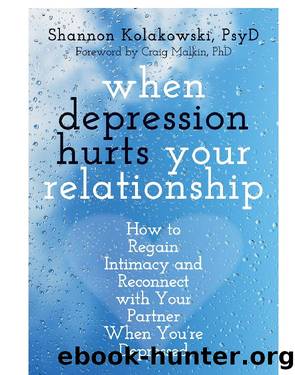When Depression Hurts Your Relationship by Shannon Kolakowski

Author:Shannon Kolakowski
Language: eng
Format: epub
ISBN: 9781608828340
Publisher: New Harbinger Publications
Published: 2014-01-30T00:00:00+00:00
A Demand/Withdraw Interaction
Intense feelings of worry from one partner can trigger what researchers call a demand/withdraw interaction. This interaction happens when one partner makes a complaint or requests a change, usually in the form of nagging, complaining, or criticizing. In response, the other partner avoids the request and withdraws from the conversation. Most frequently, women take on the demand role and men take the withdrawal role, particularly when the woman has chosen the topic of conversation (Heavey, Lane, and Christensen 1993). This demand behavior usually comes from strong emotions and frustration that your partner is failing to contribute or invest in the relationship (Sanford 2010). The demander is trying to influence some type of change in a situation found to be unfair or anxiety provoking. The more upset the demander, the more likely the conversation is to take on a coercive tone. The withdrawer, on the other hand, wants to avoid the issues, because he doesnât want to feel blamed or controlled and he anticipates that nagging or complaining will elicit these feelings (Sanford 2010).
For example, if Angela starts talking harshly with Jonathan, heâs more likely to be reactive and to shut down fast. Angela feels empty and lonely, so she pushes for more contact. Jonathan feels criticized and withdraws. In this situation, both partners have strong emotional reactions and anticipate not getting their needs met. They both easily go into demand/withdraw mode when they see conflict coming.
While all couples may have the demand/withdraw interaction at times, couples who are distressed have the highest levels of this pattern (Baucom, McFarland, and Christensen 2010). A long-term effect of this pattern is that you and your partner may try to avoid talking about heated topics altogether or be reluctant to ask about how each other is feeling. This ends up alienating you from each other rather than making you closer. It also sets the stage for emotions to explode when the issues finally surface, for resentments may have been building. As upsetting as this pattern can be, it doesnât have to continue on in this way.
Download
This site does not store any files on its server. We only index and link to content provided by other sites. Please contact the content providers to delete copyright contents if any and email us, we'll remove relevant links or contents immediately.
Should I Stay or Should I Go? by Ramani Durvasula(7642)
Why We Sleep: Unlocking the Power of Sleep and Dreams by Matthew Walker(6688)
Fear by Osho(4724)
Flow by Mihaly Csikszentmihalyi(4674)
Rising Strong by Brene Brown(4439)
Why We Sleep by Matthew Walker(4421)
The Hacking of the American Mind by Robert H. Lustig(4358)
How to Change Your Mind by Michael Pollan(4340)
Too Much and Not the Mood by Durga Chew-Bose(4324)
Lost Connections by Johann Hari(4164)
He's Just Not That Into You by Greg Behrendt & Liz Tuccillo(3874)
Evolve Your Brain by Joe Dispenza(3654)
The Courage to Be Disliked by Ichiro Kishimi & Fumitake Koga(3475)
Crazy Is My Superpower by A.J. Mendez Brooks(3380)
In Cold Blood by Truman Capote(3366)
Resisting Happiness by Matthew Kelly(3331)
What If This Were Enough? by Heather Havrilesky(3298)
The Book of Human Emotions by Tiffany Watt Smith(3284)
Descartes' Error by Antonio Damasio(3263)
